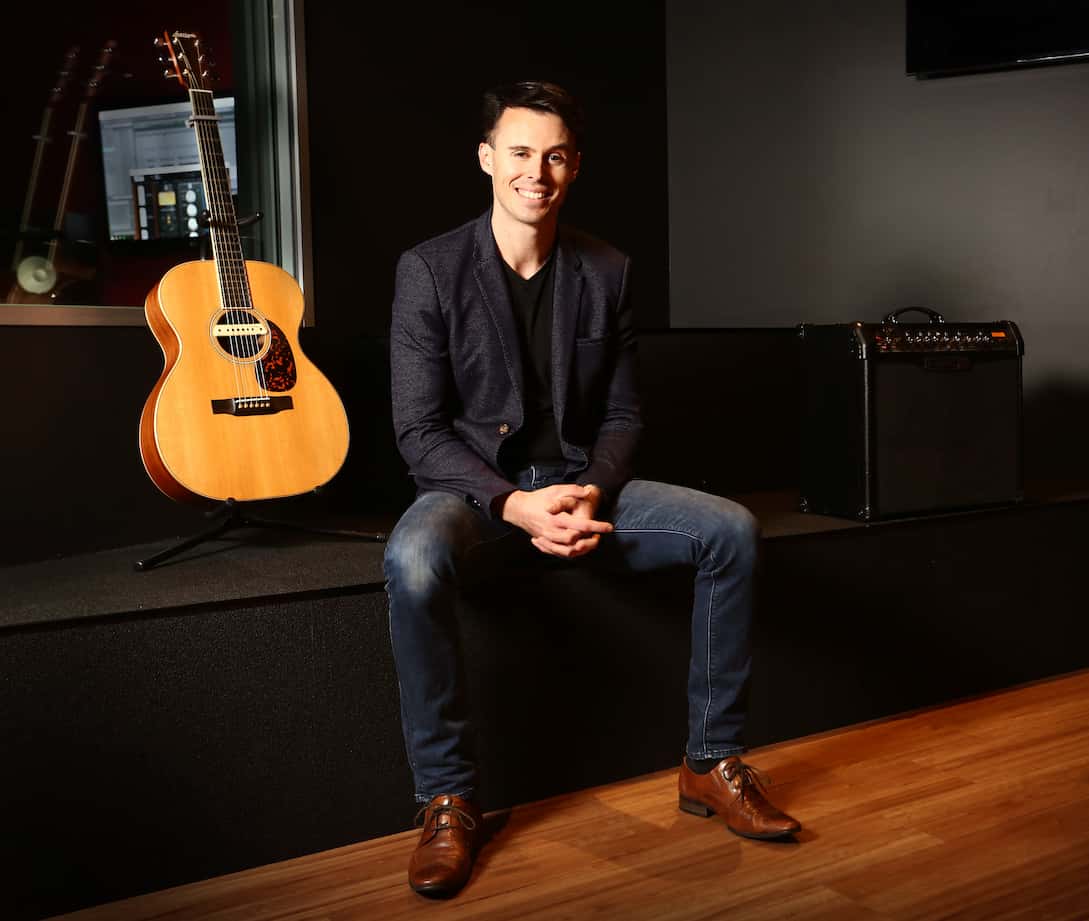 When I attended an information session with Steve Jaz the first thing he said was: “what would you do if you were an aspiring artist, with a readymade show and you were at a gig when the main act suddenly couldn’t perform. The MC comes up to the front of the stage and asks if anyone in the crowd can jump on stage and take over. What would you do?” A powerful hypothetical indeed.
When I attended an information session with Steve Jaz the first thing he said was: “what would you do if you were an aspiring artist, with a readymade show and you were at a gig when the main act suddenly couldn’t perform. The MC comes up to the front of the stage and asks if anyone in the crowd can jump on stage and take over. What would you do?” A powerful hypothetical indeed.
Sitting across from Steve once again, I relay that same hypothetical back to him. He smiles and explains the meaning behind the story. “It’s preparation meeting opportunity, being in the right place at the right time. People more commonly refer to it as luck.” Whether or not you believe in luck, the point here is a valid one. When opportunity knocks, make sure your door isn’t locked.
Sounds good in theory, but this requires confidence and clarity in what you do. Steve Jaz certainly speaks like a man with an abundance of both. Founder of Universal School of Music, who’ve had over 3500 members come through their music programs and studios since opening their doors in 2010, Steve believes “USM is a growing cultural movement in contemporary music education that is pioneering the music industry.”
A cursory glance at their website will tell you that USM offers a variety of music programs to students of all ages and levels. Delving deeper, Steve explains what makes USM unique. “We have developed a series of modularised trainings to provide a pathway into a full time career in the new music industry with a high value on application, culture and community.” In order to fully comprehend this, it’s important to look at Steve’s story.
A musician and performer in his own right, Steve’s journey is an interesting one and not atypical to a lot of aspiring musicians out there. It was his uncle who introduced him to the wonderful world of Deep Purple, Pink Floyd, Zeppelin, right through to the other end of the musical spectrum in Bach and Mozart. “From the age of 11 I knew exactly what I wanted to commit my life to, and that was music.”
Skip forward to university, it took Steve a couple of years to realise the position he was in and what university could offer him. “2 years in I was dedicating so much time to my craft and my skill and developing myself as a musician but I never really understood how I was going to make that transition into the industry and make music a career.”
Initially performing at private events and piano bars, Steve also began working with tribute shows after completing uni. “I was earning between $150-350 a gig, which was reasonable, but still not enough to sustain myself as an independent self-employed professional.” While this was happening, friends in his circle were getting full-time jobs, building careers and getting everything that’s entailed with that. “The bare necessities of a western lifestyle,” Steve jokes. Out of the loop and feeling the pressure, this struggling musician decided to get a full-time sales job in telecommunications. Stop me if you’ve heard this one before.
Balancing work with performing on the weekend was a busy lifestyle. The turning point came after a lot of soul searching and some unexpected news. “I was comfortable but there was a point where I stopped to reflect and ask myself a life changing question. It was at this point when I realised that being in a corporate 9-5 job wasn’t directly aligned to my highest values. Within just two weeks I was made redundant.” This turned out to be a blessing in disguise.
Taking time off to reflect, he started to run private lessons from home. “It brought me back to my own musical upbringing and brought to the surface the regimented music syllabus systems that currently exist in traditional teaching approaches in the private and public sectors.” Doing more research, Steve realised there was a big gap in the industry and that someone had to do something about it.
It was at this point that Steve was drawn into the world of personal development. Enticed by quantum mechanics, metaphysics and universal laws, he applied these timeless teachings in order to learn more. Inspired by Universal principals, personal development and music, I decided to bridge these two worlds together and create the Universal School of Music.”
Cut back to the present day and we get a better sense of why USM is so unique. Steve has taken his experiences and poured everything he has learnt about music and himself, personally and professionally, into USM. “What’s driving this, at the end of the day, is education. There are a lot of great teachers out there and a lot of great courses. You have all this knowledge, develop all these skills as a musician but the problem is you rack up a lot of debt and don’t necessarily have a clear pathway into the industry after completing a degree. These paradigms around education are swiftly changing and we are committed to updating the system.”
Taking a leaf out of a great philosopher’s book, he was able identify the gap in the market. “If you look at the teaching days of Aristotle, those sessions were taught smaller groups, whilst experience was part of the training. Today it’s come to the point where education has become enclosed and more of a concept than an actual application.”
Through his research and the time and effort it took to find the right team, Steve spent the better part of 5-10 years to develop and package that into a series of trainings and programs. This is where the Professional Development comes in. “In a structural sense, we’re providing a pathway into the industry. We’re facilitating this by putting all the resources in place, through our partners, working with venues, labels, working with communities, professional mentors and organisations to accommodate and support those opportunities.”
The proof is in the pudding. “On average the participants in the program, in under 4 months, have earned between $2500-3000, as their return on their initial investment.” As well as these instantaneous paid opportunities, there are no parameters around communication. The facilitators work as part of a flexible and adaptable working environment. “We’re working with them every step of the way to ensure we meet the outcomes we set out to achieve.”
It’s a pathway that starts right from the moment you walk through the doors. “At the first interview, we introduce the pathways and opportunities available so our students, clients and artists know that music be more than just a hobby. The money that’s invested could potentially have a direct return in the future.”
Speaking of this, does Steve have a vision for the future? “We’re currently assembling a team of people to lead and develop the USM model and introduce this to new communities. Through that there’s a big network to be developed as USM continues to work with our foundation to help establish a stronger industry within Australia.”
Inspired by Steve’s message, I ended up taking Steve’s program after that information session and I haven’t looked back. The future looks bright for the Australian Music Industry if Steve Jaz and USM have anything to do with it.
By Sean A’Hearn
Music Journalist, Event Manager & Talent Scout




